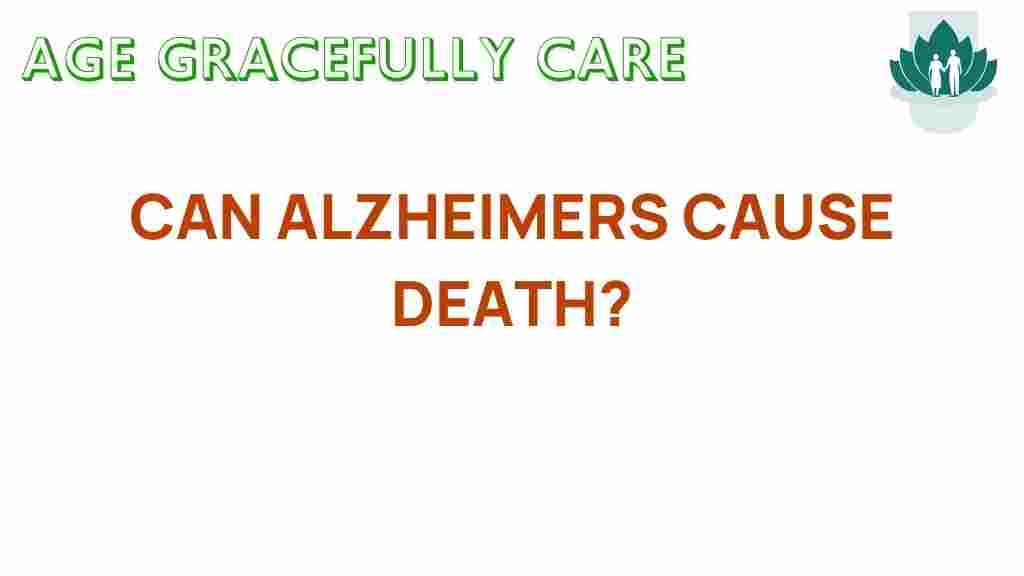Unraveling the Mystery: Can Alzheimer’s Disease Lead to Death?
Understanding the complexities of Alzheimer’s disease is essential as it impacts millions of individuals and their families worldwide. As a form of dementia, Alzheimer’s is characterized by cognitive decline, memory loss, and ultimately, a decline in the ability to perform daily activities. While many are aware of the symptoms, the relationship between Alzheimer’s, mortality, and the overall health risks associated with this brain disease often remains shrouded in mystery. In this article, we will explore how Alzheimer’s can influence mortality, the progression of the disease, and the care required to support the elderly affected by this condition.
The Connection Between Alzheimer’s and Mortality
Alzheimer’s disease does not directly cause death, but it significantly increases the risk of mortality due to various factors associated with the disease’s progression. Here are some key points to understand:
- Increased Vulnerability: Individuals with Alzheimer’s often experience a decline in physical health, making them more susceptible to infections, falls, and other complications.
- Comorbid Conditions: Alzheimer’s frequently coexists with other health issues such as cardiovascular diseases, which can further elevate health risks.
- Loss of Independence: As cognitive decline progresses, patients may lose their ability to care for themselves, leading to malnutrition, dehydration, or unsafe living conditions.
According to the Alzheimer’s Association, Alzheimer’s disease is the sixth leading cause of death in the United States. The direct impact of Alzheimer’s on mortality rates emphasizes the need for awareness and proactive care strategies.
Understanding Disease Progression
Alzheimer’s disease progresses through several stages, each with distinct characteristics and implications for care:
- Early Stage: Memory loss and mild cognitive impairment are common. Individuals may forget recent events or struggle with planning.
- Middle Stage: This stage is characterized by increased confusion, difficulty recognizing loved ones, and significant changes in behavior and personality.
- Late Stage: Individuals may lose the ability to communicate and require assistance with daily activities. Physical health complications become more pronounced.
The progression of Alzheimer’s not only affects cognitive function but also increases health risks and ultimately mortality. Understanding this progression can help caregivers plan appropriate interventions.
Health Risks Associated with Alzheimer’s Disease
As Alzheimer’s disease advances, several health risks emerge that can lead to increased mortality:
- Infections: Patients with Alzheimer’s are at a higher risk of infections, particularly pneumonia, due to weakened immune responses and difficulties in swallowing.
- Falls: Cognitive decline can impair balance and coordination, leading to an increased risk of falls, which can result in serious injuries.
- Malnutrition and Dehydration: As Alzheimer’s progresses, individuals may forget to eat or drink, leading to severe health complications.
- Cardiovascular Issues: The relationship between Alzheimer’s and cardiovascular health highlights the importance of managing heart health to mitigate risks.
Recognizing these health risks is vital for caregivers and families to provide effective support and intervention.
Providing Care for the Elderly with Alzheimer’s
Caring for individuals with Alzheimer’s requires patience, understanding, and a tailored approach. Here are some effective strategies for caregivers:
- Routine Establishment: Create a consistent daily schedule to help the individual feel secure and reduce confusion.
- Engage in Activities: Encourage participation in simple activities that stimulate cognitive function, such as puzzles, music, or art.
- Safety Modifications: Ensure the living environment is safe by removing hazards that could lead to falls or injuries.
- Nutrition Monitoring: Pay attention to dietary needs and ensure proper hydration to prevent malnutrition and dehydration.
Proper care can significantly improve the quality of life for those with Alzheimer’s and may also reduce health risks associated with the disease.
Addressing Common Concerns and Troubleshooting Tips
Caring for someone with Alzheimer’s can be challenging. Here are some common concerns along with troubleshooting tips:
- Behavioral Changes: If the individual exhibits aggression or agitation, try to identify triggers and provide a calm environment. Techniques such as redirection or music therapy can help.
- Communication Difficulties: Use simple language and maintain eye contact. Be patient and give the person time to respond.
- Wandering: If the individual tends to wander, consider using GPS tracking devices or creating a safe, enclosed area.
Additionally, connecting with support groups or resources can provide valuable insights and assistance. You can find more information on caring for individuals with dementia by visiting Alzheimer’s Association website.
Research and Future Directions
Ongoing research into Alzheimer’s and its effects on mortality is crucial for developing new treatments and preventative measures. Current studies are focusing on:
- Early Detection: Developing methods for diagnosing Alzheimer’s earlier to allow for timely intervention.
- Preventative Strategies: Investigating lifestyle changes that may reduce the risk of developing Alzheimer’s, such as diet and exercise.
- Therapeutic Approaches: Exploring new medications that may slow disease progression and improve cognitive function.
Staying informed about advancements in Alzheimer’s research can empower families and caregivers to make informed decisions regarding care and support.
Conclusion
In conclusion, Alzheimer’s disease poses significant health risks that can ultimately lead to increased mortality. The complex relationship between Alzheimer’s, dementia, and overall health emphasizes the importance of understanding disease progression and providing appropriate care for the elderly. Through proactive strategies, ongoing research, and support systems, it is possible to enhance the quality of life for individuals with Alzheimer’s and mitigate some of the associated health risks. Awareness and education are key to unraveling the mysteries of this challenging brain disease.
For further reading and support, consider visiting reputable health resources that provide insights into Alzheimer’s care and management.
This article is in the category Health and created by AgeGracefullyCare Team
